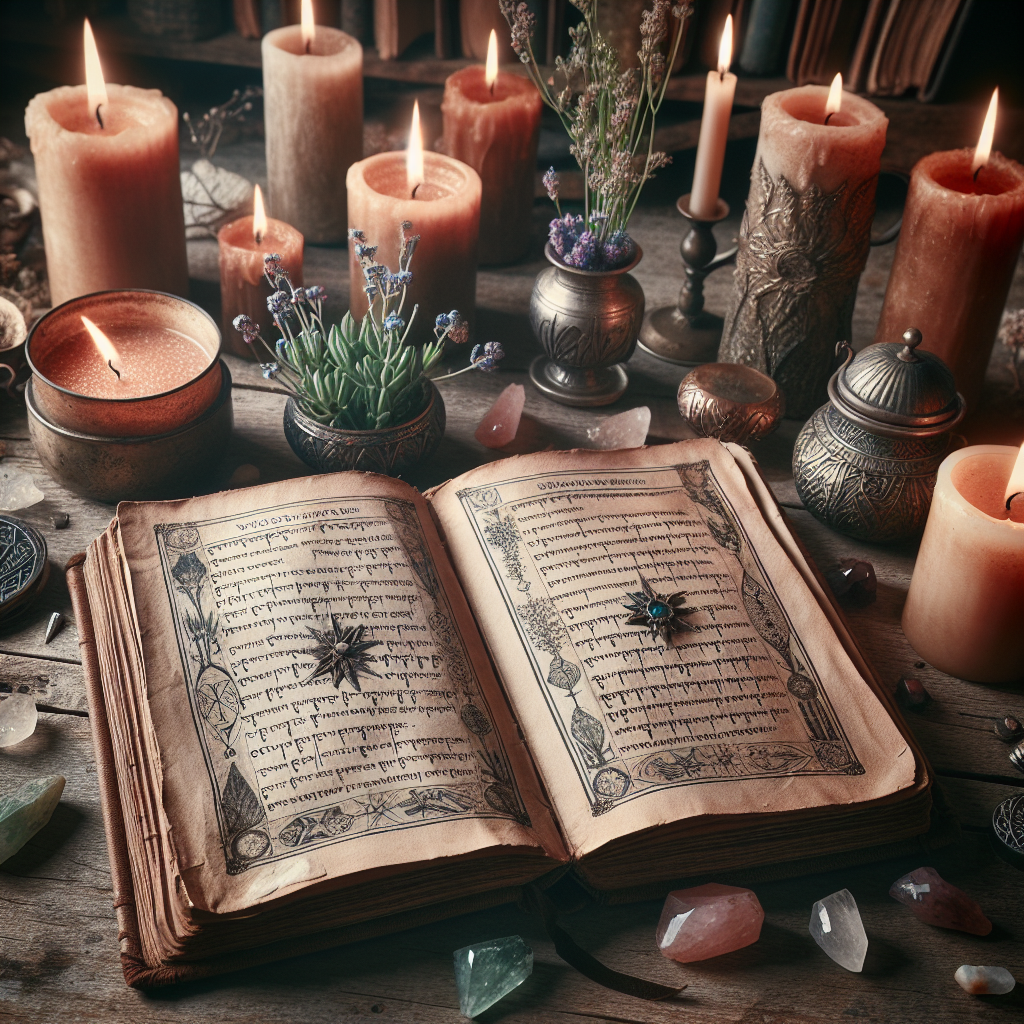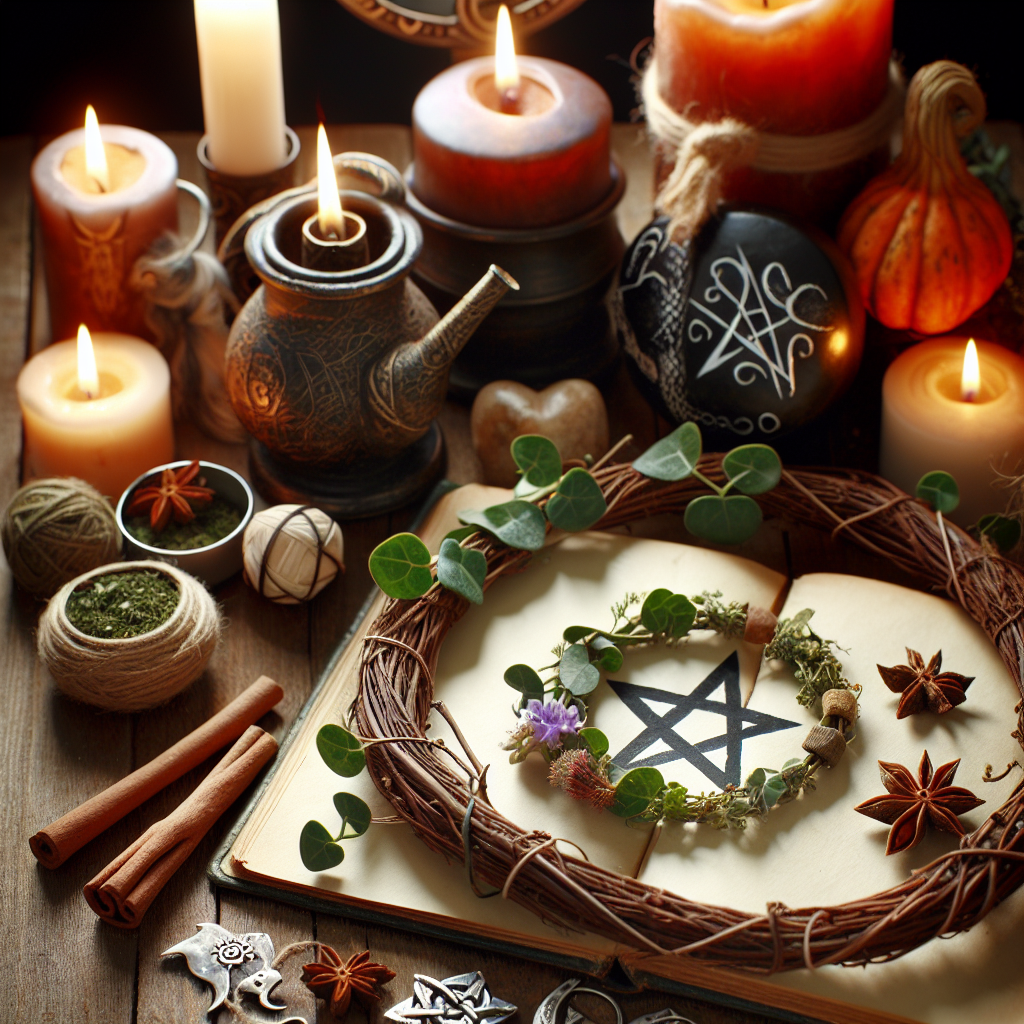As an Amazon Associate I earn from qualifying purchases.
Wiccan spells, highly revered in the ancient Pagan Wiccan tradition, are carefully crafted rituals intended to invoke personal intentions and harness nature's energies. These spells, entrenched in the belief system where magic is viewed as a tool rather than a supernatural power, are grounded in the principles of Wicca, a religion rooted in the practice of witchcraft.
The practice of crafting Wiccan spells originated from Wicca, a contemporary pagan religious movement. This belief system, tracing back to early 20th century England, was developed by the retired civil servant, Gerald Gardner. Today, Wicca has become significantly popular, with an increase in followers seeking to undertake personal and transformational journeys by engaging in the compelling practice of casting Wiccan spells.
The essence of crafting effective Wiccan spells involves setting clear intentions, understanding the importance of natural correspondences, and synchronizing with the energies of the Earth's elements, seasons, and lunar phases, among others. These elements contribute to the efficacy of the spell and help to focus the practitioner's intent, which is a key factor in successful spell casting. It's believed that ambiguity or conflicting desires can hinder the realization of a spell's objective.
A study by the Pew Research Center in 2014 revealed that Wicca has nearly doubled its followers in a decade. It exposed an increase from an estimated 8,000 Wiccans in 1980 to about 342,000 in 2008. This considerable rise in number has led to wider acceptance of the practice of witchcraft and spell casting. Additionally, this surge in interest has fostered an extensive uptake of information regarding Wiccan practices, with a focus on the basics of spell casting now being seen as an essential guide for beginners.
The practice of crafting Wiccan spells fosters self-awareness, personal growth, and connection to nature and the elements. For beginners, it is recommended to start with easy and simple to execute spells. As they become more familiar with the practice, gradually diversifying techniques and incorporating personal styles can lead to greater command over the spell casting. This learning process is a reflection of the practitioner's personal experience and discovering their unique path in Wicca.
In general, Wiccan spell crafting is more than just following scripts or recipes. It involves a considerable level of commitment, a deep emotional investment, and tacit knowledge to enhance its efficacy. This emphasizes the importance of practitioners’ personal beliefs, viewpoints, and interpretations of magical practices to have a tailor-made, intimate experience with spells. The result is a greater sense of personal empowerment and a deeper connection to nature's rhythms, which are core elements of Wiccan philosophy. The discipline is thus, widely seen as a valued spiritual journey rather than a supernatural shortcut to wish fulfilment.
How to Craft Effective Wiccan Spells for Beginners?
Wiccan spells are a significant part of the Wiccan practice. These rituals or chants involve directing your personal energy or universal energy towards achieving a particular outcome such as love, protection, or prosperity. Crafting these spells effectively involves some level of understanding and proficiency, especially for beginners. The biggest advantage of learning the art of Wiccan spell-casting is the ability to tap into the energy within and around you, allowing you to influence situations or attain your desired goals. In the following sections, we will delve deeper into the complexities of this practice, offering detailed guidance and tips for beginners to craft effective Wiccan spells.
Understanding Wiccan Spells
The power of wiccan spells is directly influenced by the practitioner’s intention, focus, willingness, and belief. Wicca, a contemporary pagan belief system, is a peaceful, balanced, and harmonious way of life rooted in nature worship and the use of magic.
The concept of wiccan spells is not about wielding supreme power or crafting harmful curses, rather it centers around healing, protection, love, prosperity, and personal growth. Women and men have equal status in Wicca, and there is a large emphasis on respect for nature and all living things.
Elemental Correspondence in Wiccan Spells
Elemental correspondence is a crucial aspect of casting wiccan spells. Each of the four elements—Earth, Air, Fire, and Water—corresponds to a direction, a time of day, a stage of life, certain symbols and types of magic. For instance, Earth is associated with the North, midnight, the elderly, pentacles, and spells for prosperity and abundance. Understanding and following these associations can significantly improve the effectiveness of your spells.
Developing Your Personal Power
An imperative aspect of casting effective wiccan spells is developing your personal power, which indicates your spiritual, psychological, and physical energy. The success of your magic depends on your ability to harness, focus, and direct this energy towards your goals.
Practicing meditation, affirmations, visualization, energy healing, and other spiritual practices can help you enhance your personal power.
Timing and Moon Phases
Timing plays a crucial role in crafting wiccan spells. The phases of the moon influence magic, with each phase corresponding to different types of spells. As a beginner, focusing your practice around the moon phases can enhance your spellcasting skills.
During the waxing moon, it's the ideal time for spells of attraction, growth, and improvement whereas the waning cycle is best for banishment, release, and endings. Full moon and new moon hold their own special significance and types of practices.
Choosing Appropriate Tools
Tools hold great importance in casting wiccan spells successfully. Essential magical tools include the athame (ritual knife), wand, chalice, pentacle, cauldron, Book of Shadows, altar cloth, candles, incense, and more.
While these tools serve to facilitate energy flow and focus intention, remember that the true power lies within you. Ensuring that your tools have been properly cleansed and consecrated will increase the effectiveness of your spells.
Creating Your Own Spells
While there are numerous prewritten spells available, creating your own spells is often more effective because it’s more personal and thereby more powerful. Your emotions, intent, and energy have a significant role to play in crafting successful spells.
Integrate chants, rhymes, incantations or affirmations into your spells. These can help to further set your intention, increase focus, and make your spell more potent.
In contemporary society, Wicca is gaining popularity due to its acceptance of diversity and empowerment of the practitioner. A study conducted by Pew Research Center in 2014 stated that 0.4% of the American population identifies as Wicca or pagan, which is approximately 1 to 1.5 million people. Considering the rise in the number of people identifying as Wiccan, it becomes even more critical to cast wiccan spells responsibly, ethically, and effectively.
1.
Q: What is the basic process of crafting a Wiccan spell?
A: Crafting a Wiccan spell involves choosing a goal or intention, gathering necessary materials, casting a circle for protection, invoking deities or energies, stating the goal, charging the spell and then closing the circle. It is also important to remember to visualize your goal and focus your intent during the entire process.
2.
Q: Can anyone do Wiccan spells or must they be a Wiccan?
A: In theory, anyone can perform spell work, as it is technically an exercise of focus and intent. However, the results of the spell can be influenced by one's belief in the craft and understanding of wiccan practices. Therefore, it is usually more effective when performed by someone who identifies as a Wiccan or follows similar spiritual practices.
3.
Q: Do I need any special tools to perform a Wiccan spell?
A: While certain tools like candles, crystals, herbs, and ritual knives can enhance spell work, they are not strictly necessary. The most important element of a spell is the focus and intent of the caster. However, using tools can help to condition the mind for spell work and enhance the energy of the spell.
4.
Q: Is it safe to craft and perform Wiccan spells?
A: Yes, it is safe to craft and perform Wiccan spells. However, the Wiccan Rede cautions followers to “harm none” with their magic. As long as you are using your spells for positive, non-harmful purposes, Wiccan spell work is safe.
5.
Q: Are there any spells that a beginner should avoid?
A: Beginners should avoid complex spells, especially those that involve manipulating other people's free will, causing harm, or dealing with forces and entities they do not understand. It's recommended to start with simple, positive spells such as those for protection, healing, and self-improvement.
6.
Q: Are love spells considered harmful in Wicca?
A: In Wicca, it is generally considered unethical to cast any spell that infringes on someone else's free will, including love spells that aim to make a specific person fall in love with you. However, love spells that invite love into your life generally, without targeting a specific individual, are usually acceptable.
7.
Q: What should I do if a spell doesn't work?
A: If a spell doesn't work, it may be due to unclear intentions, lack of belief or energy, or it could simply be that the desired outcome wasn't right for you at this time. It's recommended to reassess your goals, intentions, and methods, and try again with a clearer mind and heart.
8.
Q: How can I make my spells more effective?
A: To make your spells more effective, clearly define your goal, fully concentrate on the spell, and believe in your ability to achieve the desired result. Working with correspondences – such as moon phases, days of the week, herbs, crystals, and colours that align with your goal – can also help to enhance a spell's effectiveness.
9.
Q: Can I craft my own spells, or must I use established ones?
A: While established spells can be effective, crafting your own spell is a beneficial practice as it allows more specificity and personal connection to your intention. As long as you follow the basic steps of a spell (intention, invocation, visualization, etc.), you can tailor the rest to your personal preference.
10.
Q: How do I know if a Wiccan spell has worked?
A: Detecting the outcome of a spell can sometimes be subtle. Look for changes, even if they're small. For instance, if you cast a spell for healing, you might feel more at peace, sleep better, or notice a change in your physical health. Not all results are instant, and it may take time for the full effects of the spell to manifest.

Wrapping Up on Effective Wiccan Spells
To sum up the key notions, crafting effective Wiccan spells as a beginner crucially involves understanding the fundamental principles of Wicca, the significance of casting circles for creating protective barriers, and focusing on intent and visualisation. One needs to work on developing strong feelings for their spells’ intentions, ensuring ethical practice by avoiding harmful spells, and utilising materials like symbols, herbs and colours wisely. The right moon phase plays a significant role in the effectiveness of the spell – waxing for attraction and growth spells, full moon for power, and waning for banishing and reducing spells. Lastly, making your spells personalised can make them more powerful.
The practical insights provided in the guide serve as the groundwork for a beginner to advance in their Wiccan journey. They are encouraged to study and learn more about the craft, incorporate their personal touch, and practice with utmost patience, dedication, and integrity. Using these insights alongside the wisdom accumulated through experience can help you become proficient at casting effective Wiccan spells. Always remember, the true power of a Wiccan spell lies in the faith, intent, and effort of the practitioner.
Amazon and the Amazon logo are trademarks of Amazon.com, Inc, or its affiliates.


